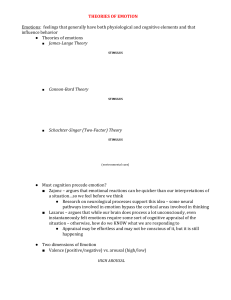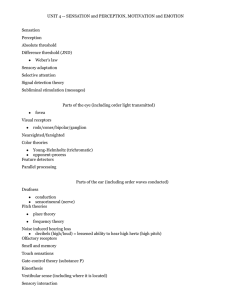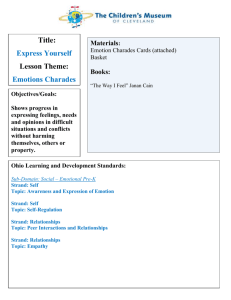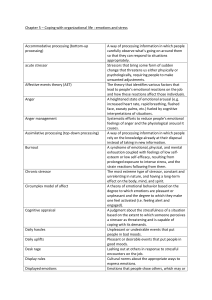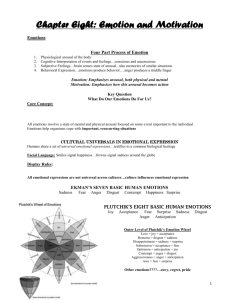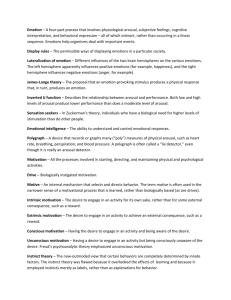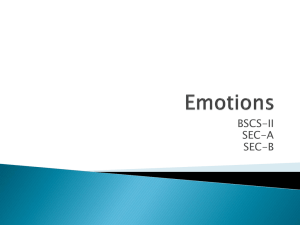Emotions Lecture Notes
advertisement
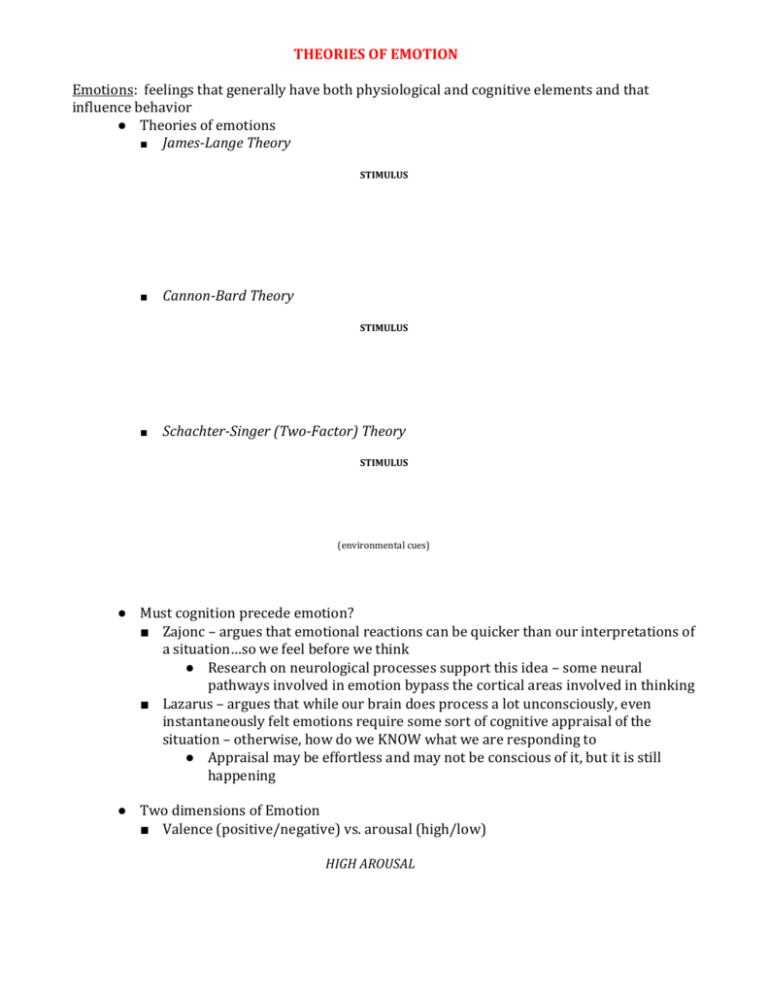
THEORIES OF EMOTION Emotions: feelings that generally have both physiological and cognitive elements and that influence behavior ● Theories of emotions ■ James-Lange Theory STIMULUS ■ Cannon-Bard Theory STIMULUS ■ Schachter-Singer (Two-Factor) Theory STIMULUS (environmental cues) ● Must cognition precede emotion? ■ Zajonc – argues that emotional reactions can be quicker than our interpretations of a situation…so we feel before we think ● Research on neurological processes support this idea – some neural pathways involved in emotion bypass the cortical areas involved in thinking ■ Lazarus – argues that while our brain does process a lot unconsciously, even instantaneously felt emotions require some sort of cognitive appraisal of the situation – otherwise, how do we KNOW what we are responding to ● Appraisal may be effortless and may not be conscious of it, but it is still happening ● Two dimensions of Emotion ■ Valence (positive/negative) vs. arousal (high/low) HIGH AROUSAL NEGATIVE POSITIVE LOW AROUSAL EXPRESSING EMOTION How do we express emotions? ● Cultural universals ● Ekman – people speak and understand pretty much the same “facial language” around the world ● Emotional “facial” universals ● Cultural differences ● Huge differences across cultures in both the context and intensity of the emotional displays ● Some emotional differences between men and women have a biological basis…but many gender differences also depend upon the culture ● Different cultures teach the sexes different display rules…actually, most research has not shown one sex to be more emotionally expressive than the other…it has more to do with the culture itself and the rules of that culture How good are we at detecting deception? ● Most of us are poor lie detectors…mainly because social interactions take place in familiar settings, where we pay little attention to nonverbal skills ● Are a few signs that can indicate “deception”… ● ● ● ● ● Polygraphs – detects level of physical arousal, like heart rate, breathing, perspiration and blood pressure ● How they work? They measure your level of arousal while being asked critical questions, irrelevant questions and control questions – all of which are mixed up during interrogation ● How accurate are they? EXPERIENCED EMOTIONS How are emotions processed? ● Unconsciously ● Linked to implicit memory & acts as an early-warning defense that produces emotions to help us get out of dangerous situations ● Relies on deep-brain circuitry that operates automatically ● Consciously ● Linked to explicit memory ● Generates emotions at a slower rate, yet delivers more complete information to consciousness Biological structures/systems involved in the experience of emotions… ● Limbic system – amygdala ● Reticular formation ● Cerebral cortex ● Autonomic nervous system ● Hormones ● Serotonin, epinephrine & norepinephrine are some of the most important in dealing with emotions How do we experience specific emotions? ● Izard – 10 basic emotions ● ● Fear ● Are learned through conditioning and observation ● ● ● Anger ● What makes us angry? ● ● Biology of fear ● Amygdala – key role in associating emotions with specific situations Is anger good or bad? ● Catharsis hypothesis – releasing aggressive energy relieves aggressive urges ● Research has shown that expressing anger can be temporarily calming, yet it usually does not clear the feelings of rage Happiness People who are happy perceive the world as safer, make decisions more easily, are more cooperative and live happier, more satisfied lives ● Feel-good, do-good phenomenon – people tend to be helpful to others when they are in a good mood ● ● Daily events generally only cause moods to be altered for that day…even significant bad/negative events, seldom destroy happiness permanently ● Adaption-level phenomenon – our tendency to judge various stimuli as relative to those we have previously experienced ● What makes a person happy? STRESS ● Stressor – a stressful stimulus, a condition demanding adaptation ● Stress: the physical and mental changes that occur in response to a challenging or threatening situation ● 4 major components to the stress response ● Cognitive appraisal ● Physiological response ● Subjective feelings ● Behavior ● Stress is NOT just another emotion ● Types of stressors ● Catastrophic events ● Life changes/strains ● Chronic stressors ● Daily hassles ● The Physical Stress Response ● Fight-or-flight response – sequence of internal processes preparing an organism to struggle or escape ● Seyle – General Adaptation Syndrome (GAS) – a three-stage pattern of responses triggered by the effort to adapt to any stressor ● Stage 1 = alarm reaction ● ● Stage 2 = resistance ● ● If stressor persists over long period…this initially adaptive alarm reaction can become distress as it depletes body’s energy and defense resources Resistance only applies to the original stressor – if an other stressor is introduced, organisms defenses could be so depleted that it would be unable to respond to second stressor Stage 3 = exhaustion Stress and the Immune System ● Any stressor can affect one’s health and resources, including the immune system ● The human immune response, which evolved to responds to short-term stressors, may react to chronic stressors by breaking down and turning on itself ● HOW?? When dealing with chronic stressors, there is no physical enemy to battle (like a cold virus), the bodily responses become maladaptive, and the body becomes more vulnerable to infection and injury ● How to cope with stress ● The methods may be… ● cognitive ● ● emotional ● behavioral ● physical
